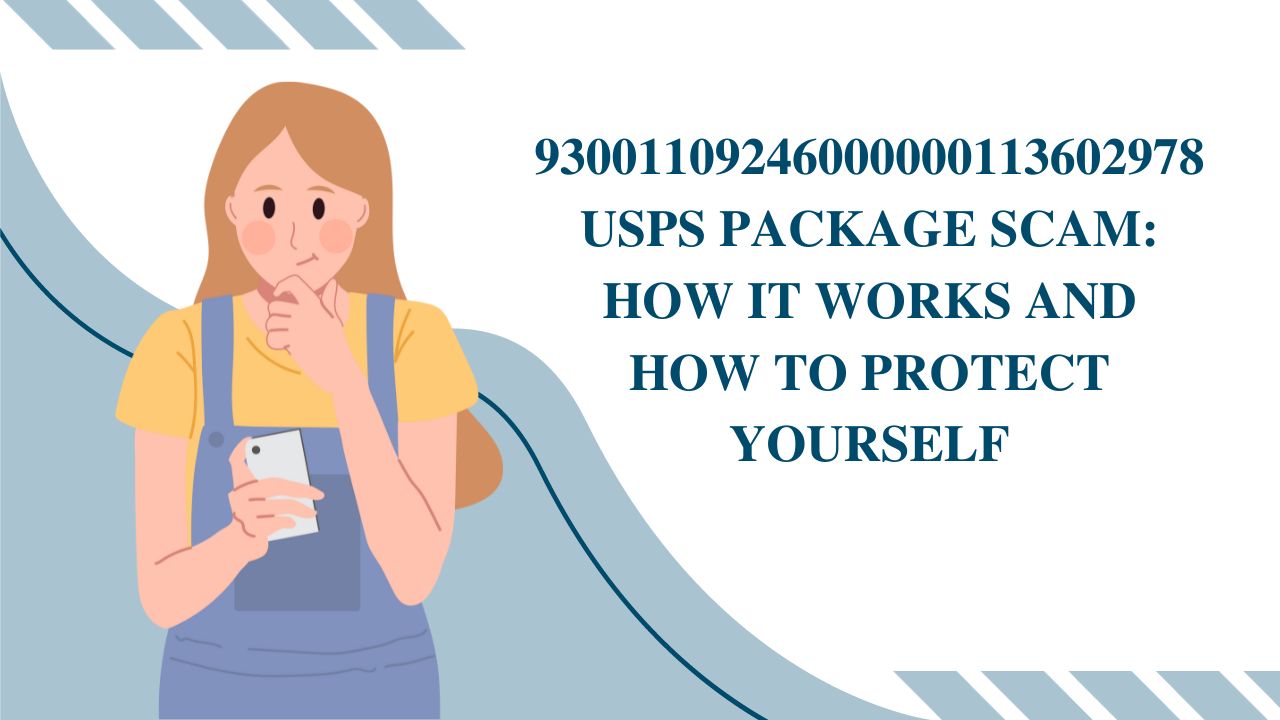The 93001109246000000113602978 USPS package scam refers to a phishing scheme where scammers send fake package delivery notifications via text or email to trick recipients into providing personal and financial information. This tracking number appears to be from USPS but is used by scammers to make their scams seem more legitimate.
How the 93001109246000000113602978 USPS Package Scam Works
The 93001109246000000113602978 USPS package scam typically works as follows:
Scammers Send Fake Tracking Number
Scammers will ship a cheap item to themselves or a random address using USPS. When the item is delivered, they retain the tracking number 93001109246000000113602978.
Later, when selling products online, they will provide this tracking number to buyers as proof of shipment even though the customer’s item was never actually shipped.
Scammers Send Phishing Message with Tracking Number
When the customer complains about not receiving the item, the scammer will send them a text or email with the fake USPS tracking number 93001109246000000113602978.
The message claims there is an issue with the delivery address and asks the victim to click on a link to resolve the problem.
Victim Clicks Link and Enters Information
If the victim clicks the link, they are taken to a phishing site impersonating USPS. The site asks the victim to enter personal information like name, address, date of birth, or financial information like credit card numbers.
Scammers Steal Victim’s Information
With the victim’s information, scammers can steal their identity or make fraudulent purchases using their credit card details. The tracking number makes the scam seem legitimate.
Recent Examples of the 93001109246000000113602978 USPS Package Scam
Here are some recent reports of the 93001109246000000113602978 USPS package scam:
- In June 2022, the Federal Trade Commission issued a warning about fake USPS texts after receiving numerous reports of the scam. Many victims reported receiving a text with the tracking number 93001109246000000113602978 that led to a phishing site when clicked.
- In August 2022, an Ohio woman reported receiving a text claiming she needed to reschedule a USPS delivery due to an incomplete address. The text contained the tracking number 93001109246000000113602978. When she visited the link, it led to a fake USPS site asking for personal information.
- In September 2022, a man in Pennsylvania reported getting a text about a USPS package requiring confirmation before delivery. The text had the tracking number 93001109246000000113602978. He almost entered his information before realizing it was a scam.
- In November 2022, the Better Business Bureau issued an alert after multiple individuals reported receiving the 93001109246000000113602978 USPS text scam. Victims who clicked the link and entered information had accounts compromised.
Who is Behind the 93001109246000000113602978 USPS Package Scam?
The individuals and groups orchestrating this scam remain unclear. Possible perpetrators include:
- Scam artists selling online: Individual scammers or scam groups selling products online could be using this tracking number trick to defraud buyers. When buyers complain about non-delivery, they send the phishing text to steal personal information.
- Organized cybercriminal groups: Sophisticated cybercrime groups could be utilizing this scam in phishing campaigns to harvest user data for identity theft and fraud.
- Foreign phishing scam operations: Some phishing scams originate overseas in countries known for cybercrime. The fake USPS texts could be part of mass global phishing campaigns.
- Bots and malware: Automated bots and malware programs can distribute phishing texts en masse. However, a human scammer has to be behind the creation of the phishing site.
While the exact source remains unclear, the scam relies on social engineering techniques to deceive unwitting victims. Scammers exploit a known USPS tracking number to add legitimacy when carrying out their phishing campaigns.
How to Protect Yourself from the 93001109246000000113602978 USPS Package Scam
Here are some tips to avoid falling victim to the fake USPS package delivery scam using the tracking number 93001109246000000113602978:
Be Wary of Unexpected Tracking Numbers
Do not click on any links in a text or email with a USPS tracking number if you are not expecting a package. Verify first that you have an upcoming delivery.
Confirm Tracking Numbers
Copy and paste the tracking number into the USPS website to confirm it is real and matches an item you ordered. Fake numbers will not return any results.
Look for Red Flags
Watch for poor grammar, spelling errors, or odd links in any communication referencing a USPS tracking number. These are signs of a scam.
Avoid Clicking Links in Messages
Never click on links in unsolicited texts, emails, or calls claiming to be from USPS. Manually type usps.com into your browser to check tracking numbers.
Protect Your Device
Keep your electronic devices updated and use security software to help detect phishing scams and malware. Do not enter information if redirected to a suspect site.
Monitor Accounts
Watch for unauthorized charges or activity if you shared any financial information through a potentially fraudulent site or text. Alert your bank immediately of any suspicious transactions.
Report USPS Scams
Forward any fake USPS emails or texts to spam@uspis.gov. You can also report to the FTC at ReportFraud.ftc.gov. Provide details like the tracking number, sender phone/email, screenshots, etc. to aid investigations.
The 93001109246000000113602978 USPS package scam can easily fool consumers expecting deliveries into giving up valuable personal data. Being cautious of unsolicited requests for information, watching for red flags, and reporting scams can help you avoid becoming the next victim. Stay vigilant about any communications referencing USPS tracking numbers.

